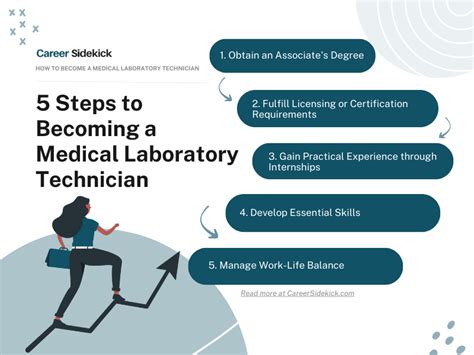Are you interested in a career in healthcare, but not sure if you want to spend years in medical school? Becoming a medical technologist (med tech) could be the perfect solution. Med techs play a vital role in the healthcare system, working behind the scenes to analyze samples and provide critical information to doctors and other medical professionals. In this article, we'll explore the training time and career guide for becoming a med tech.
What is a Medical Technologist?
A medical technologist, also known as a clinical laboratory technologist, is a healthcare professional responsible for analyzing body fluids, tissues, and cells to help diagnose and treat diseases. Med techs work in laboratories, hospitals, and other healthcare facilities, using specialized equipment and techniques to examine samples and provide accurate test results.
Key Responsibilities of a Med Tech
Some of the key responsibilities of a med tech include:
- Collecting and preparing samples for testing
- Conducting laboratory tests and analyzing results
- Maintaining and calibrating laboratory equipment
- Recording and reporting test results
- Collaborating with other healthcare professionals to interpret test results

Training Time for Med Techs
To become a med tech, you'll typically need to complete a combination of education and training. Here's a step-by-step guide:
- Earn an Associate's Degree: Most med techs start by earning an associate's degree in medical technology or a related field. These programs typically take two years to complete and include coursework in subjects like biology, chemistry, and mathematics.
- Complete a Clinical Internship: As part of your associate's degree program, you'll typically participate in a clinical internship, where you'll gain hands-on experience in a laboratory setting.
- Obtain Certification: While certification is not always required, it's highly recommended. The American Society for Clinical Pathology (ASCP) offers a certification exam for med techs, which can help you stand out in the job market.
- Maintain Certification: To maintain certification, you'll need to complete continuing education requirements and adhere to professional standards.
Certification Options for Med Techs
There are several certification options available for med techs, including:
- Medical Technologist (MT)
- Medical Laboratory Technician (MLT)
- Clinical Laboratory Technologist (CLT)

Career Guide for Med Techs
Med techs can work in a variety of settings, including hospitals, laboratories, and research institutions. Here are some potential career paths for med techs:
- Clinical Laboratory Technologist: Work in a hospital or laboratory setting, conducting tests and analyzing samples.
- Research Laboratory Technologist: Work in a research setting, conducting experiments and analyzing data.
- Quality Control Specialist: Work in a laboratory setting, ensuring that equipment and procedures meet quality standards.
- Educator: Teach medical technology courses at a college or university.
- Consultant: Work as a consultant, helping laboratories and healthcare facilities improve their operations and procedures.
Salary and Job Outlook for Med Techs
The salary and job outlook for med techs are promising. According to the Bureau of Labor Statistics (BLS), the median annual salary for med techs is around $52,000. The BLS also projects that employment of med techs will grow 11% from 2020 to 2030, faster than the average for all occupations.

Conclusion
Becoming a med tech requires a combination of education, training, and certification. With a strong foundation in science and laboratory procedures, med techs play a critical role in the healthcare system. Whether you're interested in working in a clinical laboratory setting or pursuing a career in research, there are many career paths available to med techs.






What is the average salary for a med tech?
+The median annual salary for med techs is around $52,000.
How long does it take to become a med tech?
+Typically, it takes two years to complete an associate's degree program in medical technology.
What are the certification options for med techs?
+There are several certification options available, including Medical Technologist (MT), Medical Laboratory Technician (MLT), and Clinical Laboratory Technologist (CLT).
